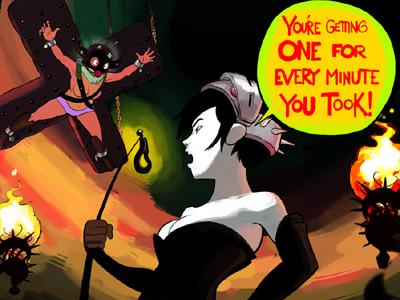People who create video games can feel like outcasts. While the medium has become more popular over the past decade, there remains a geeky social stigma. Being a transgendered game developer, then, adds a whole new level of outsiderness. But Anna Anthropy, an outspoken trans-dyke game developer, sees her differences as an opportunity to bring fresh perspectives to the industry.
“I always felt like an outsider in video games because of my gender identity,” says Anthropy. “I’m not interested in the traditional mode of games.”
The expectations for conventional game development are different too. There’s a constant eye on the bottom line. A game like Modern Warfare, for example, is huge business. Its most recent release cost a staggering $200 million. It was a huge bet that paid off, earning $550 million in its first week. And when there is such huge business pressure, artistic aspirations often get usurped.
“Like being a cog in the machine,” says Anthropy.
Part of the appeal of being outside the mainstream, says Anthropy, is the freedom to tell personal stories. That feeling leads Anthropy to develop small, intimate projects that challenge familiar concepts in video games by filtering them through a personal, often queer, sensibility.
In Calamity Annie, for example, the protagonist is a gunslinger on a quest to bring justice to the wild west, all while courting the affections of a mysterious townswoman. The goal of another game, Mighty Jill-Off, is to help Jill, the stout hero dressed head-to-toe in a leather bondage outfit, scale a booby-trapped tower to win the affections of her queen. While the mainstream video game industry is stuck in a cycle of retreads and sequels, Anthropy is part of an alternative movement.
“Each game Anna develops is built upon a single idea, and she squeezes so much out of that single idea,” says Toronto illustrator and independent game maker Benjamin Rivers. “Anna’s games make you want to study them, and that is endlessly inspiring to me.”
While there are queer voices in traditional cultural media, there is a relative vacuum in the video game space.
“I think more queer people should be telling their stories and getting them out there,” says Anthropy. “It’s part of why I try to be more visible as much to the degree that I can, because I want people know that there are people out there doing stuff. The only way video games will become more queer is if more queer people make games.”
And that is becoming easier as the ability to make games becomes more democratized.
“We’re at that age now where pretty much anyone can get their hands dirty,” says Anthropy. “It’s still tricky, but it’s becoming more and more easy.”
She lists game building applications such as Gamemaker, Click and Play, Construct, and Inform as handy tools for people interested in making their own games in their own voices.
For aspiring game developers, or even the byte-curious, Anthropy suggests the best thing to do is to dive in and accept trial-and-error.
“Just start making stuff now. Do whatever you can do. If you want to, you will find a way to do it. People no longer need to be fans of games, everyone can be a creator.”


 Why you can trust Xtra
Why you can trust Xtra


